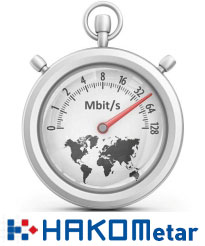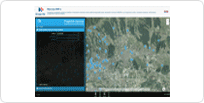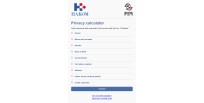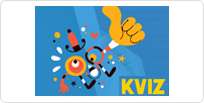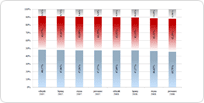Hakom - Croatian Post and Electronic Communications Agency
e-Agency
Users:
Cost Estimator
The Holder of Framework Programme
GIS portal
Privacy calculator
Application ''Quiz''
Market survey
The Republic of Croatia Recorded the Biggest Increase in DESI Value amongall the EU Member States
PRESS RELEASEDESI 2016 for the Republic of Croatia attained a score of 0,42 and thus places Croatia on the 24th place among the 28 EU Member States just like in 2015, when DESI for Croatia amounted 0,38.
The European Union (EU) as a whole is progressing and DESI 2016 for the entire EU amounts 0, 52, compared to 0, 50 in 2015. However, the EU Member States are at different stages of development progressing at different speeds. DESI 2016 for the Republic of Croatia (RH) is 0,42 and Croatia is currently situated on the 24th place within the 28 EU Member Statesjust like in2015 when the DESI amounted 0,04. However, the Republic of Croatia has recorded the highest growth of index values among the all EUMember States with an annual growth of 0.04 and it is situated in a group of the countries that are rapidly approaching the EU average along with Spain, Italy, Latvia, Romania and Slovenia.
The Republic of Croatia is most lagging behind the EU average in the category of Connectivitywhich includes the following sub-categories: the broadband Internet coverage, broadband density in relation to the number of households, utilization of the frequency spectrum allocated for the broadband access in relation to the objectives of the EU, the prices of fixed broadband access according to the PPP and the density of mobile broadband connections in relation to the population. In this category it should be noted that the use of the radio frequency spectrumwhich is significantly lower than the EU average depends on the size of the market and the number of operators of mobile communications networks in the particular market. However, the Republic of Croatia isreachinga significant increase in the index value of 0.05 as compared to 2015 by pointing that the standard for the electronic communications market development is slowly bringing results.
In order to make asignificant progress in the Republic of Croatia in the DESI it is insufficient to look only at the degree of market liberalization and investment opportunities on the electronic communications market in Croatia but it is necessary to take into account the overall picture of the state of the economy and the purchasing power of citizens. In other words, it must be worked on further development of the whole eco-system consisted of the digital economy and society.According to the DESI level, Croatia should make further steps to increase the digital competence of the population, to reduce the imbalance in the regional development andto increase the purchasing power of citizens
Since there is an imbalance in the Republic of Croatia regarding the regional development it is difficult to expect a significant improvement in the network coverage and the usage of broadband Internet access in less developed regions until the development in all areas of the economy is balanced at the state level. Several years ago HAKOM recognised these systemic challenges and by its program support, bearing in mind the amount of available funds, it began to reducethe gap. The next important step for Croatia will be an effective use of funds from the EU development funds for the construction of the access networks in the areas where operators currently have no economic interest to invest. In such a manner and with the increased investment of all stakeholders and participants on the electronic communications marketin the Republic of Croatia it can be influencedon the increase of DESI in the years to come. The above mentioned can be also seen in the preparation of the new Strategy for Broadband Development in the Republic of Croatia in the period from 2016 to 2020 with the objective to create astimulating environment for the investment and construction of the Broadband high speed networks in the areas where there is sufficient commercial interest to invest in Broadband high-speed networks.
In addition to reducing disparities of regional development it is necessary to develop digital competence. It can be noted that countries with lower digital competences have worse results in the connectivity and the availability of the Broadband access. Basic and advanced skills necessary for the possibilitiesoffered by digital society contribute to the DESI,starting withthose that are simple enablingthe online interaction and consumption of digital goods and services to those more advanced that are having better efficiency and the economic development. Also, it is necessary to increase the Internet use among the population, especially bythe elderly, who are sometimes reluctant to use new technologies and thus do not take advantage of the digital economy.
The integration of digital technologies into the economy and the use of online sales channels is one of the indicators of the index as well as developed public digital services focused on e-government applications such as the “e-citizens” who are developing and expanding a range of digital services to the citizens. It should be noted that all these factors are interrelated, so, for example, the use of the Internet is closely linked to digital competence of the population. Digital competence is recognized and knownas one of eight basic competences for lifelong education by the EU in order to successfully respond to the challenges of the development of the knowledge society and the world market. A good example for a better understanding of the impact on the index isthe announced curricular reform, which provides better digital literacy and the development of modern competencies and skills. The impact of such reforms will have a significant positive impact on the DESI index because the planned education outcomes can be found in several Index subcategories and can effect on the overall picture of the degree of society development. In other words, by encouraging the development of modern technologies at all levels, from the economic to the social ones, followed by the development of new competences, we can ensure a faster development and prosperity of the economy and society.
In addition to the imbalance of regional development and the necessity to strengthen the digital competence of the population it is important to take into account the purchasing power of citizens. The purchasing power in terms of GDP per capita affects demand because the services of Broadband access arevery expensive compared to other EU Member as they are placed in a ratio with purchasing power.
Eventually, HAKOM considers that that we are reaching the point where some regulatory policies, limited to the electronic communications sector will not bein position to influence the development of the demandand to motivate the operators to invest and increase the availability of services. It is necessary to have strategic policies with more related sectors with an emphasis on the increased digital competence and purchasing power of citizens, and with the ultimate aim of further Broadband access growth as one of the main generators of economic growth in the years to come.
All the information on DESI index for all theEU Member States and Croatia, published by the European Commission can be found at the following links: https://ec.europa.eu/digital-agenda/en/progress-country and https://ec.europa.eu/digital-agenda/en/node/66894
# # #
For additional information please contact:
Croatian Regulatory Authority for Network Industries (HAKOM)
Roberta Frangeša Mihanovića 9
10110 Zagreb, Croatia
Tel. + 385 (0) 1 700 70 07
Fax + 385 (0)1 700 70 70
Media inquiries can be submitted online using HAKOM’s official website:
Registration required.
ABOUT HAKOM: HAKOM (www.hakom.hr) - Croatian Regulatory Authority for Network Industries – ensures preconditions for a fair market competition, stable growth and environment for innovations in the electronic communications and postal services market. HAKOM protects users’ interests and the possibility of choice among various communications and postal services at affordable prices, defines sustainable competitive conditions for operators and service providers under fair conditions for return on investment, and provides support to economic growth, public services and the quality of life in the Republic of Croatia by using modern technologies. HAKOM’ strategic goals are: to promote regulation of the electronic communications and postal services market, to support growth of investments and innovations in the electronic communications and postal services market, to provide efficient use of limited resources, to accelerate the growth of broadband products and services, to provide affordable offers of communications and postal services, to provide protection and informing of users, to build an efficient and comprehensive information system, to define and implement efficient processes, and to acquire multi-disciplinary competencies in market regulation.
.


